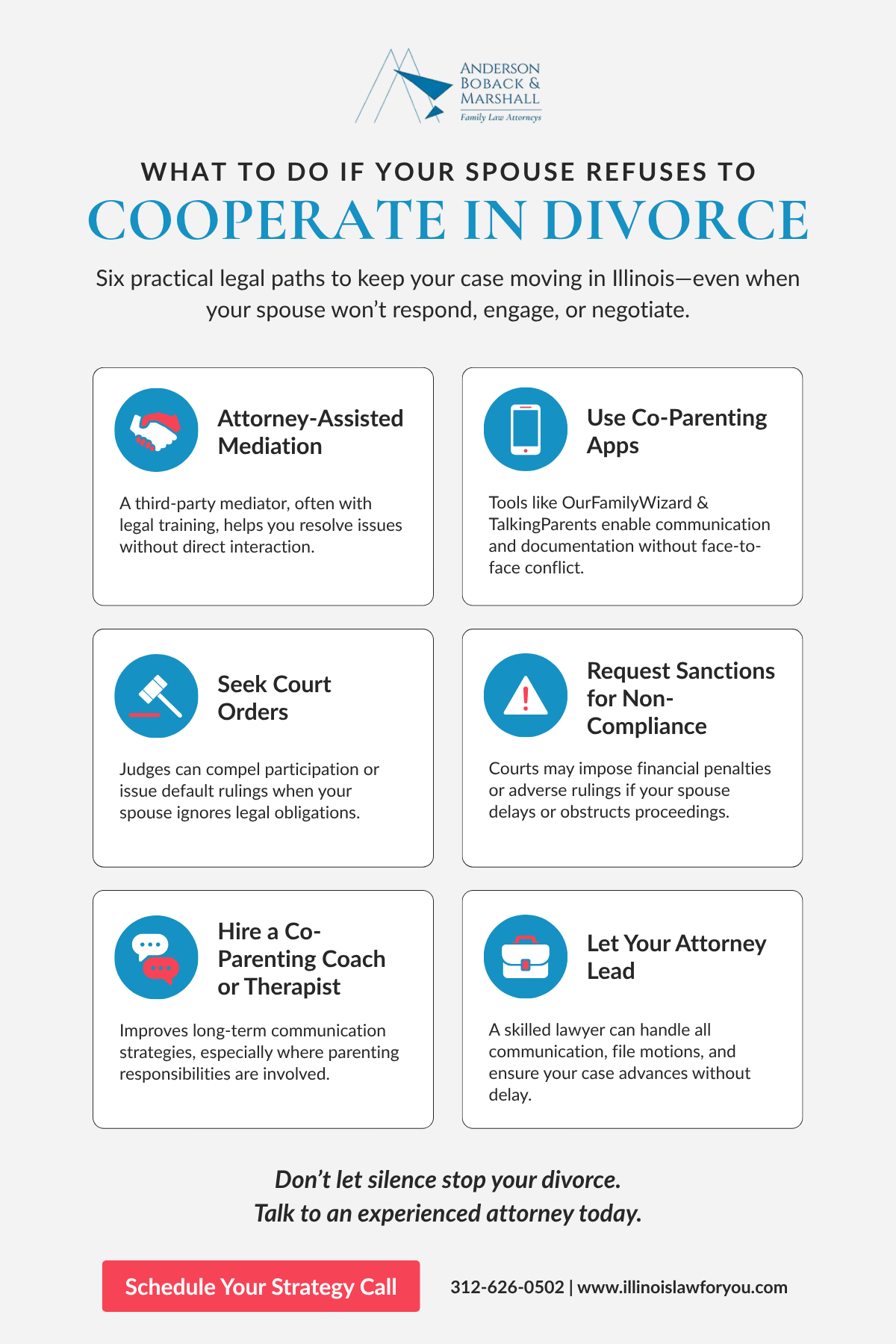Going through a divorce can be emotionally draining, especially when your spouse refuses to communicate or cooperate. If your spouse is unresponsive, avoids contact, or obstructs the divorce process, you may feel frustrated and helpless. It’s important to know that you don’t have to go through this alone. You have legal options and tools that can help you move forward, even when communication has broken down.
Why Spouses Refuse to Communicate During Divorce
There are several reasons why a spouse may refuse to communicate during a divorce. For some, it’s a way to avoid difficult conversations or emotional conflict. For others, it might be a form of emotional manipulation or control. Regardless of the reason, this behavior can create serious challenges—especially if you need to make decisions about children, finances, or division of property. If you find yourself in this situation, it’s crucial to stay focused on your goals and explore available legal options.
What Can You Do When Your Spouse Won’t Communicate?
Even if your spouse refuses to engage, there are still ways to move forward with your divorce. Let’s explore some of the most common strategies and legal steps you can take to protect your interests and reach a fair resolution.
1. Attorney-Assisted Mediation
One of the first steps you can take when your spouse is uncooperative is mediation. Mediation is a non-confrontational method of resolving disputes with the help of a neutral third party, often an attorney or professional mediator. If both parties agree, mediation can be an effective way to address the issues at hand.
Why it works: Mediation is particularly useful when direct communication is impossible. Your attorney can act as your advocate, helping to facilitate discussions and find common ground. If necessary, the mediator can break the issues into smaller, more manageable discussions. Though mediation is not binding, it helps both spouses work together toward a resolution without the need for extensive litigation.
2. Utilize Parenting & Communication Apps
When children are involved, communication is key—even if your spouse isn’t willing to engage directly. Fortunately, there are several court-approved apps that can help facilitate co-parenting without direct communication. These apps allow both parents to track schedules, exchange messages, and keep records of all interactions.
Popular apps include:
Why it works: These apps provide a neutral platform for managing communication while ensuring that all exchanges are documented. This can be helpful if you need to refer back to a conversation or need evidence of your spouse’s refusal to cooperate. Additionally, they reduce the emotional stress of having to deal with your spouse directly.
3. Court Orders and Judicial Intervention
If mediation or communication tools fail, and your spouse continues to be uncooperative, it may be necessary to involve the court. You have the option of asking the court to compel your spouse to participate in the divorce process. If your spouse ignores deadlines or refuses to cooperate, the court may issue sanctions, default judgments, or other penalties.
For example:
- Custody and visitation issues: A judge may take your spouse’s lack of cooperation into account when making decisions about parenting time and responsibilities.
- Property division: The court may also move forward with asset division, even if one spouse refuses to negotiate or provide information.
Why it works: The court can enforce participation in the divorce process, ensuring that your case moves forward. If your spouse is violating court orders, you can ask the judge to impose penalties, including fines or other sanctions.
4. Co-Parenting Coaching or Therapy
If your spouse’s refusal to communicate is making co-parenting difficult, consider involving a neutral third party like a co-parenting coach or therapist. These professionals specialize in teaching separated or divorced parents how to communicate effectively for the sake of the children.
Why it works: A coach or therapist can help you and your spouse develop better communication strategies. This is particularly helpful if your spouse is emotionally resistant to direct communication or is unwilling to negotiate parenting issues.
5. Parenting Classes and Skills Training
In Illinois, divorcing parents are required to complete a parenting education course. However, when communication is an issue, additional courses may be necessary. Parenting education classes and conflict resolution workshops can teach you valuable skills to navigate difficult conversations and manage emotional stress.
Why it works: Even if your spouse is unwilling to participate, taking a parenting class on your own can give you the tools to better handle conflict and improve communication with your spouse. Many courses focus on managing emotions, reducing conflict, and handling disagreements in a respectful and productive manner.
6. Let Your Attorney Serve as Your Voice
When all else fails, your attorney can be your voice. Lawyers are experienced in handling high-conflict divorce situations and can communicate on your behalf. They can draft necessary documents, request information, and negotiate with your spouse’s attorney. This approach ensures that your rights are protected and that your case is not delayed due to your spouse’s refusal to engage.
Why it works: A skilled attorney can help you move your case forward, even when your spouse is being uncooperative. They can also ensure that all legal steps are followed and that your interests are represented in negotiations and court hearings.
Learn how our Chicago Family Law Lawyers can help
Moving Forward: Staying Focused on Your Goals
It can be incredibly difficult to move forward with your divorce when your spouse is uncooperative. However, it’s important to remember that there are legal options and strategies available to you. Whether through mediation, communication apps, court orders, or attorney intervention, there are ways to keep your case on track.
If you’re struggling to communicate with your spouse or facing significant obstacles, it’s essential to consult with an experienced Chicago divorce attorney. An attorney can guide you through the process, protect your interests, and help you navigate the challenges that arise during a high-conflict divorce.
Frequently Asked Questions (FAQs)
Is it possible to get a divorce if my spouse won’t respond or participate?
Yes. Courts can issue a default judgment if your spouse consistently ignores communication or legal notices. You don’t need your spouse’s cooperation to finalize a divorce, but you will need to follow the proper legal procedures through your attorney or the court.
Can the court force my spouse to participate in the divorce process?
Yes. If your spouse is avoiding participation, the court can issue orders to compel cooperation. Non-compliance may result in sanctions, fines, or default rulings on issues like custody or property division.
How can I co-parent effectively if my ex refuses to talk to me?
Use court-approved co-parenting apps that allow secure, documented communication without needing face-to-face or direct messaging. These platforms are ideal for managing schedules, sharing information, and documenting interactions for legal use.
What role does an attorney play if my spouse won’t talk to me?
Your attorney can act as your voice in the divorce process, handling communication, filing motions, negotiating terms, and ensuring legal deadlines are met—even if your spouse refuses to cooperate.
















